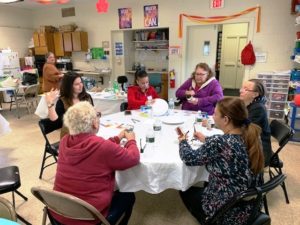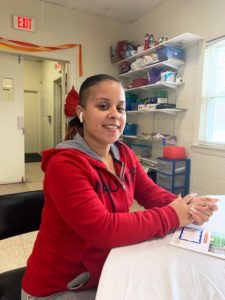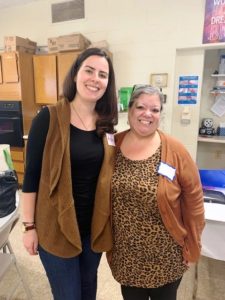Talk/Read/Succeed!
Shopping healthy foods: How to know for sure
At Springfield Housing Authority’s Sullivan Apartments, residents learned a few good things recently about shopping for healthy foods at the grocery store.
A few key tips: Read the labels. Avoid salt and sugar. Buy whole grain products. Compare similar products by cost, weight, and nutritional value. Watch those calories.
The ‘Cooking Matters’ session was brought to Sullivan by Talk/Read/Succeed!, a family-based early literacy program that includes families in the quest for literacy, good health, education and financial independence.

Cooking Matters participants at Springfield Housing authority’s Sullivan Apartments discuss nutrition and pricing strategies when grocery shopping.
The afternoon event featured Kristin Cunningham of Cooking Matters Massachusetts, an organization that helps to end childhood hunger by inspiring families to make healthy, affordable food choices. At Sullivan, she presented in both Spanish and English, using cans, jars and boxes of food, along with laminated nutrition posters, for a group comparison of commonly purchased grocery items.
Springfield Housing Authority Denise Jordan said guiding parents to be savvy shoppers can only be a good thing.
“When moms and dads are out there buying food for their families, they want to know how important it is to read those labels, and to compare among brands,” Jordan said. “We welcome programs that share this with our families.”
The lessons hit home for residents like Yomary Smith, who shops for her family that includes two young daughters.

Sullivan resident Yomary Smith said she will be looking a lot harder at labels while grocery shopping, following the Cooking Matters presentation.
“For me, there were a few surprises,” Smith said. “It shocked me to see the sugar content in some of the sodas, and some of the other products. I’ll be double-checking the labels from now on, for sure.”
T/R/S! Program Coordinator Zenaida Burgos organized the event as part of an ongoing focus to promote good health among families at Sullivan. T/R/S! runs at two other SHA developments, Duggan Park and Robinson Gardens.
“It was exciting to hear from the residents who participated, that they enjoyed the workshop and they have learned new things about eating healthier,” Burgos said. “One resident told me she is not going to drink soda anymore, after she learned of how much sugar is in a 16-ounce bottle. Another said she now understands what whole grains are and why they are so important.”
Burgos added, “It is so important to educate our families and bring such programs that can make a difference in their lives as well as their own families. Programs like this helps our residents to be proactive to live healthier lifestyles.”

Sullivan resident Betty Bonilla said the presentation had a few surprises, such as sugar content in popular drinks and yogurts.
Cunningham’s presentation was informative and very participant-friendly. With props, cans and jars of food and posters, she had the eight participants look for calorie, sugar and salt counts in a variety of foods, including breads, beans, meats, cereals, yogurt, milk and soda.
One example: One glass of whole milk includes 150 calories, 8 grams of fat, 35 milligrams of cholesterol, and 120 milligrams of sodium. Make that a 2 percent milk and those numbers drop to 130 calories, 5 grams of fat, 20 milligrams of cholesterol, and 125 milligrams of sodium. Better yet, 1 percent milk has 110 calories, 3 grams of fat, 10 milligrams of cholesterol and 125 milligrams of sodium.
Another: Black beans, uncooked in a bag, with a serving of one-quarter cup dry, has 70 calories, no fat, no cholesterol, 23 grams of carbohydrates, 20 milligrams of sodium and 1 gram of sugar. That serving also has 15 grams of dietary fiber and 9 grams of protein. From the can, a one-half cup serving has 100 calories, no fat, no cholesterol, 460 milligrams of sodium, 18 grams of carbohydrates and 7 grams of protein. Low-sodium canned beans have 100 calories per half-cup serving, no fat, no cholesterol, 130 milligrams of sodium, 18 grams of carbohydrates and 7 grams of protein.
“You can see how important it is to get to know your labels, both for nutritional value and for cost,” Cunningham said.

Cooking Matters Community Engagement Associate Kristin Cunningham with Talk/Read/Succeed! Program Coordinator Zenaida Burgos.
The women expressed shock when looking at the counts of a few popular beverages: Vitamin water, 120 calories, 32 grams of sugar; ginger ale, 140m calories, 50 milligrams of sodium, 36 grams of carbohydrates; cola, 140 calories, 39 grams of sugar, 45 milligrams of sodium.
Cunningham noted that total daily calorie intake for the average sized woman should be about 2,000, with men able to consume 2,500 to maintain weight.
Sullivan resident Betty Bonilla said she found the workshop to be an eye-opener of facts and data.
“I will definitely be looking at the nutritional information from now on when I go shopping,” Bonilla said. “You bet.”
She liked learning the specifics of why whole wheats are so much healthier than regular wheat products, or those washed white, including breads and flours.
Cunningham said she hoped the women went away with some practical information they can take with them and use on a regular basis.
“It’s not about making changes in leaps and bounds,” she said. “It’s about taking steps in your daily life that will mean healthier choices for yourself and your family. We hope they’ll use this information to be better shoppers and better consumers of food.”







